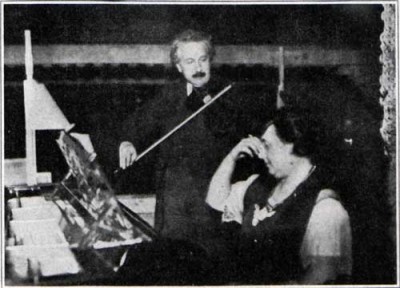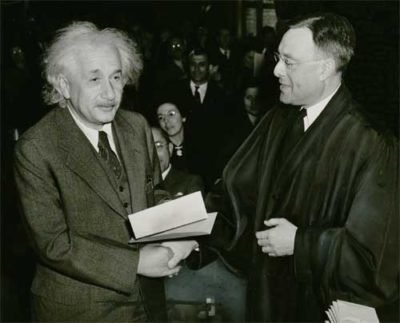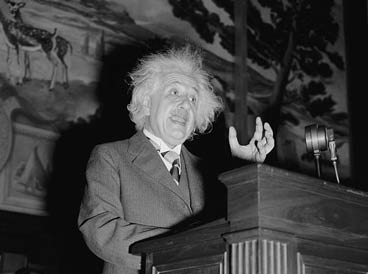Relativity: Einstein’s Explanation
Like psychoanalysis, autosuggestion, and the Lost Generation, relativity was one of those trendy terms everyone used in the 1920s but few understood.
The nation’s newspapers informed readers that relativity was a revolutionary idea that would change our understanding of the universe, but they were rarely able to explain any further.
“The meaning of relativity,” Einstein said in a 1929 interview with The Saturday Evening Post, “has been widely misunderstood. Philosophers play with the word, like a child with a doll. Relativity, as I see it, merely denotes that certain physical and mechanical facts, which have been regarded as positive and permanent, are relative with regard to certain other facts in the sphere of physics and mechanics. It does not mean that we have the right to turn the world mischievously topsy-turvy.” (Read the entire the interview here “What Life Means to Einstein: An Interview by George Sylvester Viereck”; October 26, 1929.)
And still Americans used the word for what they thought it should mean: Everything is relative. An act was only ‘good’ or ‘bad’ in relation to something else. There were no absolutes.
Hoping to correct this error, James R. Newman wrote an extensive article on Einstein’s theories for The Saturday Evening Post in 1959. “The statement that everything is relative is as meaningful as the statement that everything is bigger. As Bertrand Russell pointed out, if everything were relative there would be nothing for it to be relative to.
“The name relativity is misleading. Einstein was in fact concerned with finding something that is not relative, something that mathematicians call an invariant. With this as a fixed point, it might be possible to formulate physical laws which would incorporate the ‘objective residue’ of an observer’s experience; that is, that part of the space and time characteristics of a physical event which, though perceived by him, are independent of the observer and might therefore be expected to appear the same to all observers.” (See “Einstein’s Great Idea” by James R. Newman; May 16, 1959.)
Relativity reconciled the mechanical model of the physical world—as described by Isaac Newton—to a universe in which scientists could measure the distance of light years and the speed of electrons. He achieved this with a mathematical model that amended Newton’s claim that time was absolute, true, and flowed evenly without interference.
As shown in Einstein’s explanation, reproduced by Newman and printed in the Post, time did not ‘flow’ identically for two observers. Two events that appeared simultaneous to one person could appear sequential to another.
Einstein’s Own Example of the Relativity of Time
The diagram shows a long railroad train traveling along the rails with velocity (V), in the direction toward the right of the page.
The bottom line denotes the embankment running parallel to the rails.
The letters A and B mark two places on the rails, and the letter M marks a point on the embankment directly midway between A and B.
At M stands an observer equipped with a pair of mirrors that are joined in a “V” and inclined at 90 degrees. By means of this device he can observe both places, A and B, at the same time.
We imagine two events at A and B, say two flashes of lightning, which the observer perceives in his mirror device at the same time. These he pronounces to be simultaneous, by which he means that the rays of light emitted at A and at B by the lightning bolts meet at the midpoint M of the length A—> B along the embankment.
Now consider the moving train, and imagine a passenger seated in it.
As the train proceeds along the rails, the passenger will arrive at a point M1, which is directly opposite M, and therefore exactly midpoint between the length A —> B along the rails.
Assume further that the passenger arrives at M1 just when the flashes of lightning occur.
We have seen that the observer at M correctly pronounces the lighting bolts as simultaneous; the question is, will the train passenger at M1 make the same pronouncement? It is easily shown that he will not.
Obviously if the point M1 were stationary with respect to M, the passenger would have the same impression of simultaneity of the lightning flashes as the observer on the embankment. But M1 is not stationary; it is moving toward the right with the velocity (V) of the train.
Therefore (considered with reference to the embankment) the passenger is moving toward the beam of light coming from B, and away from the beam coming from A.
It seems clear then that he will see the beam emitted by the flash at B sooner than the beam emitted by the flash at A. Accordingly he will pronounce the flash at B as earlier in time than the flash at A.
Which of the two pronouncements is correct, the observer’s or the passenger’s?
The answer is that each is right in its own system. The observer is right with respect to the embankment, the passenger with respect to the train. The observer may say that he alone is right because he is at rest while the passenger is moving and his impressions are therefore distorted.
To this the passenger can reply that motion does not distort the signals, and that, in any case, there is no more reason to believe that he was moving and the observer at rest than that the passenger was at rest and the observer moving.
There is nothing to choose between these views, and they can be logically reconciled only by accepting the principle that simultaneity of events is meaningful only with respect to a particular reference system; moreover, that every such system has its own particular time, and unless, as Einstein says, we are told the reference system to which the statement of time refers, a bare statement of the time of an event is meaningless.
Did relativity profoundly change our lives, as the newspapers of the 1920s claimed? Not directly—unless you’re able to drive your car at the speed of light, in which case relativity would be a matter of infinite concern to you. But relativity did lead to other innovations, such as nuclear power and GPS.
So, you can live quite comfortably without understanding why energy = (mass) x (the speed of light squared). Just keep your speedometer under 186,282 miles per second and you’ll be fine.
Albert Einstein: “Imagination Is More Important Than Knowledge”
In this 1929 interview with a Post reporter, Albert Einstein discussed the role of relativity, why he thought nationalism was the “measles of mankind,” and how he might have become a happy, mediocre fiddler if he hadn’t become a genius in physics.
When a Post correspondent interviewed Albert Einstein about his thought process in 1929, Einstein did not speak of careful reasoning and calculations. Instead —
“I believe in intuitions and inspirations. I sometimes feel that I am right. I do not know that I am… [but] I would have been surprised if I had been wrong
“I am enough of the artist to draw freely upon my imagination. Imagination is more important than knowledge. Knowledge is limited. Imagination encircles the world.”
Something else that was circling the globe in that year was Einstein’s reputation. At the time of this interview, his fame had spread across Europe and America. Everywhere he was acclaimed a genius for defining the principles of relativity, though very few people understood what they meant.
Imagination may have been essential to his breakthrough thinking, but Einstein’s discovery also rested on his vast knowledge of physical science. Knowledge and imagination let him see the relationship between space, time, and energy. Using mathematics, he developed a model for understanding how objects and light behave in extreme conditions — as in the subatomic world, where the old Newtonian principles didn’t appear to work.
Whenever Einstein explained his work to the popular press, though, reporters got lost in his talk of space-time continuum, absolute speed of light, and E=Δmc2. So they used their own imaginations to define relativity. One of their misinterpretations was the idea that relativity meant everything is relative. The old absolutes were gone. Nothing was certain anymore.
It was a ridiculous interpretation that could only have made sense if newspaper readers were no bigger than a proton, or could travel near the speed of light.
This misperception was so common that the Post writer used it to start his interview.
“Relativity! What word is more symbolic of the age? We have ceased to be positive of anything. We look upon all things in the light of relativity. Relativity has become the plaything of the parlor philosopher.”
Einstein, as always, patiently clarified his concept.
“‘The meaning of relativity has been widely misunderstood, Philosophers play with the word, like a child with a doll. Relativity, as I see it, merely denotes that certain physical and mechanical facts, which have been regarded as positive and permanent, are relative with regard to certain other facts in the sphere of physics and mechanics. It does not mean that everything in life is relative and that we have the right to turn the whole world mischievously topsy-turvy.'”
The world of the early 20th Century certainly felt like it was being inverted — with or without relativity. Even as Einstein was developing his theory about the space-time continuum and the nature of light, old Europe was dying in record numbers. Just a few weeks before Einstein released his general theory of relativity in 1916, the German Imperial Army began its assault at Verdun. In the ensuing, ten-month battle, France and Germany suffered 800,000 casualties. Four months later, the British launched their catastrophic attack at the Somme and suffered 58,000 casualties in a single day.

The survivors of these debacles were disillusioned by the waste of this war, and the peace that followed. The youth of Europe and America were looking for new truths. The old ones seemed empty and especially lethal to young men. They saw how noble sacrifice could be used for political ends. And they had seen how virtue and faith fared against massed machine guns.
This “Relativity” they read about seemed promising, if it meant that thousands wouldn’t have to die needlessly, of that could live beyond the limiting moral codes of their parents.
Einstein, himself, didn’t indulge in any of this relativism. He was a man of strong beliefs, not equivocations. For instance, his love of music was absolute.
“‘If… I were not a physicist, I would probably be a musician. I often think in music. I live my daydreams in music. I see my life in terms of music. I cannot tell if I would have done any creative work of importance in music, but I do know that I get most joy in life out of my violin.'”
“Einstein’s taste in music is severely classical. Even Wagner is to him no unalloyed feast of the ears. He adores Mozart and Bach. He even prefers their work to the architectural music of Beethoven.”
He disagreed with the traditional Jewish concept of free will.
“I am a determinist. As such, I do not believe in free will. The Jews believe in free will. They believe that man shapes his own life. I reject that doctrine philosophically. In that respect I am not a Jew… Practically, I am nevertheless, compelled to act as if freedom of the will existed. If I wish to live in a civilized community, I must act as if man is a responsible being.”
He never expressed any belief in a personal God, but he believed in the historical Jesus — not the popularized prophet such as appeared in a best-selling biography by Emil Ludwig.
“Ludwig’s Jesus,” Einstein replied, “is shallow. Jesus is too colossal for the pen of phrasemongers, however artful. No man can dispose of Christianity with a bon mot.”
“You accept the historical existence of Jesus?”
“Unquestionably. No one can read the Gospels without feeling the actual presence of Jesus. His personality pulsates in every word. No myth is filled with such life. How different, for instance, is the impression which we receive from an account of legendary heroes of antiquity like Theseus. Theseus and other heroes of his type lack the authentic vitality of Jesus.”
Einstein was no relativist on the subject of nationalism, which he saw grow violent and intolerant from his Berlin home.
“Nationalism is an infantile disease. It is the measles of mankind.”
It was different in the United States, he believed.
“Nationalism in the United States does not assume such disagreeable forms as in Europe. This may be due partly to the fact that your country is so immense, that you do not think in terms of narrow borders. It may be due to the fact that you do not suffer from the heritage of hatred or fear which poisons the relations of the nations of Europe.”

Three years later, Einstein fled Germany to seek asylum in the United States, where he became a citizen in 1940. (Not for the last time, America was enriched by the intolerance of other countries.)
It is interesting to see how Einstein viewed America three years before he made it his new home.
“In America, more than anywhere else, the individual is lost in the achievements of the many. America is beginning to be the world leader in scientific investigation. American scholarship is both patient and inspiring. The Americans show an unselfish devotion to science, which is the very opposite of the conventional European view of your countrymen.
“Too many of us look upon Americans as dollar chasers. This is a cruel libel, even if it is reiterated thoughtlessly by the Americans themselves. It is not true that the dollar is an American fetish. The American student is not interested in dollars, not even in success as such, but in his task, the object of the search. It is his painstaking application to the study of the infinitely little and infinitely large.”
The only criticism Einstein could find for America was its emphasis on homogenizing its citizens into a single type.
“Standardization robs life of its spice. To deprive every ethnic group of its special traditions is to convert the world into a huge Ford plant. I believe in standardizing automobiles. I do not believe in standardizing human beings. Standardization is a great peril which threatens American culture.”
Read “What Life Means to Einstein,” by George Sylvester Viereck. Published October 26, 1929 [PDF].

